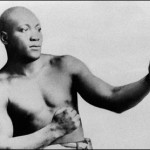Tulsa to Search for Mass Graves From the Race Massacre of 1921
During the pogrom, a white mob killed an estimated 300 black Tulsans. According to eyewitnesses, the dead are buried in unmarked mass graves in Greenwood
Image: Tulsa in flames during 1921 race riots
(Smithsonian.com) On May 31, 1921, white men with weapons waited outside a Tulsa, Oklahoma, courthouse. Inside, a 19-year-old black shoeshiner named Dick Rowland was being detained for allegedly attacking a white elevator operator. Fearing that Rowland would be lynched, black men armed themselves and showed up at the courthouse to counter the white men’s show of force. Soon enough, a fight broke out. Outnumbered, the black men retreated to Greenwood—then a thriving black neighborhood known as Black Wall Street—and the white men took chase.
What followed was a bloody massacre that continued on into the next day. The racially motivated incident killed more than 300 black Tulsans and displaced an estimated 10,000. Before it was all over, at least 35 city blocks burned to the ground. Survivors recounted stories of bodies being tossed off bridges and into unmarked mass graves. Now, reports DeNeen L. Brown at The Washington Post, Tulsa Mayor G.T. Bynum has announced plans to investigate those accounts by searching for the unmarked graves.
“We owe it to the community to know if there are mass graves in our city,” Bynum tells Brown. “We owe it to the victims and their family members. We will do everything we can to find out what happened in 1921.” (more)
Julius Whittier, Texas’ pioneering African-American player, dies at 68
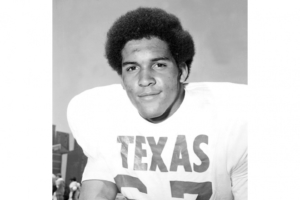 (Dallas Morning News) The rain was coming down that day in 1972 when Julius Whittier caught that touchdown pass with his mother watching from the stands. It was one of Whittier’s favorite memories — and the only touchdown pass that season for the accomplished University of Texas football team.
(Dallas Morning News) The rain was coming down that day in 1972 when Julius Whittier caught that touchdown pass with his mother watching from the stands. It was one of Whittier’s favorite memories — and the only touchdown pass that season for the accomplished University of Texas football team.
“To be a starting athlete on one of the best teams in the country — there’s just no comparison,” he would say in Bill Little’s book, What It Means To Be a Longhorn. “Football was my vehicle to become a Longhorn. Being a Longhorn is not simply about playing sports, it’s about being part of the university life.”
Whittier, the first African-American letter winner in Texas Longhorns’ football history and a longtime Dallas County criminal prosecutor, died Tuesday morning. He was 68.
No cause of death was provided, but Whittier had dealt extensively with the effects of Alzheimer’s disease — a condition his younger sister, Mildred Whittier, blamed on the physical effects of his groundbreaking college football career. (more)
‘A cry for freedom’: The Black Power salute that rocked the world 50 years ago
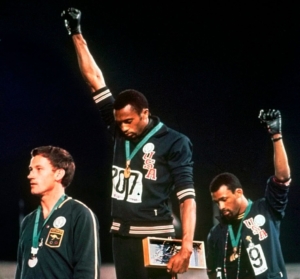
Americans Tommie Smith, center, and John Carlos raise their gloved fists in a human rights protest during their medal ceremony at the Summer Olympics in Mexico City on Oct. 16, 1968. Australian silver medalist Peter Norman stands at left on the podium. (AP)
(Washington Post) The Black Power salute photo, one of the most influential protest images of all time, was captured 50 years ago when U.S. sprinters Tommie Smith and John Carlos stepped onto the world stage during the Summer Olympics in Mexico City.
It was Oct. 16, 1968. Smith had just won gold and Carlos had taken bronze in a blazing 200-meter dash. Australian sprinter Peter Norman, who had won silver, stood to their right.
When “The Star-Spangled Banner” began to play, Smith lowered his head and raised his right fist.
Carlos raised his left.
Life magazine photographer John Dominis raised his lens.
Click.
Dominis’s photograph would freeze that moment of silent protest. The picture would slingshot around the world, capturing all the angst and anger of 1968. The photo would become an iconic image of the Black Power movement and an emotional reference point among NFL players who kneel during the national anthem to protest police brutality. (more)
How the Sears Catalog Revolutionized African American Shopping Under Jim Crow
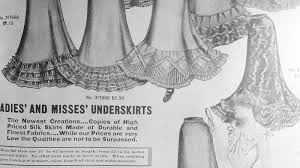 (Pictorial) On Monday, Sears filed for bankruptcy after 132 years of operation, spurring a wave of eulogies and sometimes outright sentimentalizing for the company that got its start as the R.W. Sears Watch Co. in Minneapolis and grew to become an iconic retail giant through its innovative catalog.
(Pictorial) On Monday, Sears filed for bankruptcy after 132 years of operation, spurring a wave of eulogies and sometimes outright sentimentalizing for the company that got its start as the R.W. Sears Watch Co. in Minneapolis and grew to become an iconic retail giant through its innovative catalog.
Prompted by the news, Professor Louis Hyman of Cornell University, a labor historian and author of Temp: How American Work, American Business, and the American Dream Became Temporary, outlined a surprising piece of American history in a fascinating Twitter thread. Through the creation of its national catalog available to all Americans, and by allowing consumers to buy on credit, Sears revolutionized the way black Americans could shop by offering access without the threat of violence, inexpensive prices, and—perhaps most radical of all—choice. (more)
CALL FOR PAPERS: TIPHC Journal of History and Culture
 The Journal of History and Culture (JHC) is a peer-reviewed publication of the Texas Institute for the Preservation of History and Culture (TIPHC) at Prairie View A&M University. The TIPHC is digitally documenting the almost 500-year history of African American presence in Texas.
The Journal of History and Culture (JHC) is a peer-reviewed publication of the Texas Institute for the Preservation of History and Culture (TIPHC) at Prairie View A&M University. The TIPHC is digitally documenting the almost 500-year history of African American presence in Texas.
Each JHC edition explores multidisciplinary issues related to African American, Latino, Asian, Native American and other Diaspora communities with a specific focus on those issues as they relate to Texas. Contributions from all fields of scholarship are welcome. You may view previous JHC issues here: https://www.pvamu.edu/tiphc/publications/.
We are now accepting abstracts for the next JHC issue scheduled for late Spring 2019 which will focus on “400 years: African American Struggles, Triumphs, and Survival Since 1619.” Our theme is in conjunction with the 2019 quadricentennial commemoration of the arrival of the first enslaved Africans in English-speaking Colonies which later became the United States. As for Texas, when enslaved people in the Lone Star State were finally informed of their freedom on June 19, 1865, Anglo Texans were sure it was a sign of the apocalypse, “the end of the Negro race.” Yet, we’re still here, still rising.
Click here for submission information.
TIPHC Bookshelf
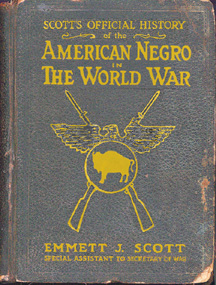 Published scholarship on black history in Texas is growing and we’d like to share with you some suggested readings, both current and past, from some of the preeminent history scholars in Texas and beyond. We invite you to take a look at our bookshelf page – including a featured selection – and check back as the list grows. A different selection will be featured each week. We welcome suggestions and reviews. This week, we offer “American Negro in the World War,” by Emmett J. Scott.
Published scholarship on black history in Texas is growing and we’d like to share with you some suggested readings, both current and past, from some of the preeminent history scholars in Texas and beyond. We invite you to take a look at our bookshelf page – including a featured selection – and check back as the list grows. A different selection will be featured each week. We welcome suggestions and reviews. This week, we offer “American Negro in the World War,” by Emmett J. Scott.
From the book’s preface: “The Negro, in the great World War for Freedom and Democracy, has proved to be a notable and inspiring figure. The record and achievements of this racial group, as brave soldiers and loyal citizens, furnish one of the brightest chapters in American history. The ready response of Negro draftees to the Selective Service calls together with the numerous patriotic activities of Negroes generally, gave ample evidence of their whole-souled support and their 100 per cent Americanism. It is difficult to indicate which rendered the greater service to their Country—the 400,000 or more of them who entered active military service (many of whom fearlessly and victoriously fought upon the battlefields of France) or the millions of other loyal members of this race whose useful industry in fields, factories, forests, mines, together with many other indispensable civilian activities, so vitally helped the Federal authorities in carrying the war to a successful conclusion. (1919)”
The book can be read here.
This Week in Texas Black History
Oct 15
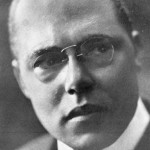 Houstonian Emmett Scott was appointed Special Assistant to the Secretary of War, Newton Baker, on this day in 1917 as a liaison between black soldiers and the War Department amid rising racial tensions in the country. Among Scott’s accomplishments in that role were:
Houstonian Emmett Scott was appointed Special Assistant to the Secretary of War, Newton Baker, on this day in 1917 as a liaison between black soldiers and the War Department amid rising racial tensions in the country. Among Scott’s accomplishments in that role were:
- The formation of a Speakers’ Bureau, or “Committee of One Hundred,” to enlighten black Americans on the war aims of the government.
- The continuance of training camps for black officers and the increase in their number and increasing their scope of training.
- Betterment of the general conditions in the camps where blacks were stationed in large numbers, and positive steps to reduce friction between
- The opening of every branch of the military service to colored men, on equal terms with all others, and the commissioning of many colored men as
officers in the Medical Corps. - A report about conditions facing African-Americans during the period, which were published in 1919 as The American Negro in the World War.
Oct 18
On this day in 1912, World Heavyweight Champion and Galveston native Jack Johnson was arrested for violating the Mann Act against transporting women across state lines for immoral purposes, specifically prostitution, because of his relationship with a white woman who was Johnson’s fiancée. Her refusal to cooperate in his prosecution doomed the case though Johnson would be arrested again less than a month later on similar charges, however, the woman involved this time testified against him. Johnson was convicted by an all-white jury and sentenced to a year and a day in prison, but he jumped bail and left the country for France. He wouldn’t fight for over a year until he defeated Jim Johnson, an African-American, in Paris in the first fight for the heavyweight championship between two black men.
Oct 19
Two-time Grammy Award winner Jennifer Holliday was born on this day in 1960 in Houston. Inspired by Congresswoman and fellow Houston native Barbara Jordan to be a good citizen and a good person, Holliday began singing in the Pleasant Grove Baptist Church choir. She gained fame in the starring role of Effie “Melody” White in the Broadway production “Dreamgirls,” for which Holiday earned a Tony Award for Best Actress in a Musical. In the show, she sings “And I Am Telling You I’m Not Going,” which also reached No. 1 on R&B charts.
Blog: Ron Goodwin, Ph.D., author, PVAMU history professor
Ron Goodwin is an assistant professor of history at Prairie View A&M University. Even though he was a military “brat,” he still considers San Antonio home. Like his father and brother, Ron joined the U.S. Air Force and while enlisted received his undergraduate degree from Texas Lutheran University in Seguin, Texas. After his honorable discharge, he completed graduate degrees from Texas Southern University. Goodwin’s book, Blacks in Houston, is a pictorial history of Houston’s black community. His most recent book, Remembering the Days of Sorrow, examines the institution of slavery in Texas from the perspective of the New Deal’s Slave Narratives.
Recent Posts
The revolution “was” televised
Fifty years ago, black revolutionaries adopted the phrase “the revolution will not be televised” in response to the vast social upheaval of the 1960s. Many Vietnam War protestors believed the new medium of television would be the venue that illustrated the change in American democracy. However, black revolutionaries believed television would not capture the full essence of the movement because the changes that must occur in this society will be live and not scripted by…(more)
Democratic Party – Fifty Years Later
In 1968, the Democratic Party met in Chicago to nominate its candidate for president. The Party was in chaos after the violent deaths of Robert Kennedy and Martin Luther King, Jr. While King was not an acknowledged political figure, his non-violent social stance and his views on American involvement in Vietnam was influencing public policies. Perhaps more influential in the forthcoming implosion of the Democratic Party was the death of Robert Kennedy. His politics of…(more)
Submissions wanted
Historians, scholars, students, lend us your…writings. Help us produce the most comprehensive documentation ever undertaken for the African American experience in Texas. We encourage you to contribute items about people, places, events, issues, politics/legislation, sports, entertainment, religion, etc., as general entries or essays. Our documentation is wide-ranging and diverse, and you may research and write about the subject of your interest or, to start, please consult our list of suggested biographical entries and see submission guidelines. However, all topics must be approved by TIPHC editors before beginning your research/writing.
We welcome your questions or comments. Please contact Michael Hurd, Director of TIPHC, at mdhurd@pvamu.edu.

